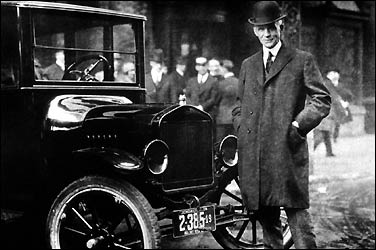The Challenge of Change
April 24, 2023

The history of Henry Ford and the Model T illustrates a fundamental truth about leadership: leaders never outgrow the need to change.
On his way to dominating the automotive market with the Model T, Henry Ford embodied innovation and progress. By pioneering the assembly line, Ford slashed the amount of time needed to manufacture an automobile. He installed large conveyor belts in his factory, allowing workers to stay in one place rather than roaming around the factory floor. He also shortened the workday of his employees from nine hours to eight hours so that his factories could operate around the clock.
The efficiencies Ford introduced allowed cars to be manufactured at a fraction of their previous costs. In under a decade, automobiles went from being luxuries affordable only to the wealthiest Americans, to being standard possessions of the average American family. Ford profited handily from the popularity of the Model T, and Ford Motor Company grew into an empire.
However, the dominance of Ford Motor Company was short-lived. As competitors changed their operations to copy Ford’s concepts mass production, Henry Ford made a tremendous leadership blunder. With cars rolling off assembly lines like never before, consumers began to demand a variety of colors. However, Ford stubbornly refused, uttering the famous line, “The customer can have any color he wants so long as it’s black.”
In Ford’s mind, producing multiple colors was foolhardy since black paint dried the fastest and could be used most efficiently. Amazingly, Ford did not comprehend the human preference for variety. Customers flocked en masse to other producers who catered to their color preferences, and Ford Motor Company never regained its grip on the market.
Read more
16 Rules I Try to Live By
March 22, 2023
by GoDaddy.com Founder, Bob Parsons
Of all the articles I’ve written for my Blog, this was the most popular. I’ve received many comments from readers saying they felt that part of, or all of, this article has either helped them with either something they were dealing with, or something they wanted to accomplish. Perhaps you will also find it interesting and/or helpful as well.
Late in 2004, I was asked by BizAz Magazine (a local Phoenix magazine) to speak at one of its “Business Beneath The Surface” breakfast meetings. As part of the event, participants have the option of submitting questions to the speakers, which are then answered during the breakfast.
One of the questions directed toward me was, “What advice do you have for someone who is just starting a business?”
I liked Clint Eastwood’s rules.
Also at that time, I happened to pick up a copy of Men’s Journal. Clint Eastwood was on the cover and an article featured 10 items called “Clint’s rules.” I found his rules to be interesting. They were things like, “You are what you drive,” “avoid extreme makeovers,” and things like that. As Clint Eastwood is a pretty easy guy to respect, I thought the whole rule thing was pretty cool. And the more I thought about it, I realized that over the years I had accumulated a number of principles (or rules) that I tried very hard to adhere to — and these rules (in many ways) have become the foundation for whatever successes I’ve had.
So, a few weeks before the meeting, I sat down and started typing — in no particular order — the rules I try to live by. At the breakfast meeting, I read my rules at the end of my presentation. The response was amazing. I was swamped with requests for copies of the rules. An edited list was published in the Arizona Republic newspaper a few days later. I was even called and interviewed by a local radio station about the list.
Since then, some of the rules have been edited, some consolidated, and a few new ones added. Despite those changes, the list of rules I presented that morning are pretty much what appears at the end of this post.
As I write this, I am now 54 years old, and during my life thus far I suspect that I’ve encountered more significant life events than most people ever dream about. Here’s some information about me:
I grew up in a lower middle class family in Baltimore’s inner city. We were always broke. I’ve earned everything I ever received. Very little was ever given to me.
I’ve been working as long as I can remember. Whether it was delivering or selling newspapers, pumping gas, working in construction or in a factory, I’ve always been making my own money.
And, of course, not all life events are happy ones.
I was stood up to be executed during a robbery of a gas station where I was working when I was 16. To my amazement, my would-be executioner could not muster the nerve to pull the trigger. This saved both of us. I lived, and while he went to jail, he did not go there forever. Even though there were other witnesses to the gas station robbery and assault, and other crimes he and a partner committed, I was the only one who testified against them. They both received major jail sentences.
I was with a United States Marine Corps rifle company in Viet Nam for a short while in 1969. As a combat rifleman, I learned several key life lessons that resulted in some of the rules I try to live by. I learned first hand how significant a role “luck” or karma can play in our lives. The rifle company I was assigned to, Delta Company of the 1st Batallion, 26th Marines, operated in the rice paddys of Quang Nam province. We operated on the squad level (7 to 10 of us, depending on casualties), and most every night we left our command post and went several kilometers out into the rice paddys and set up in ambush. While there are many who saw significantly more combat action than me, I did see my share. After 5 or 6 weeks, I was wounded and medevaced to Japan. I returned to Viet Nam several times after that, but came back as a courier of classified documents. Although I requested (at least twice) to return to my old rifle company, the transfer was never approved.
After the Marine Corps, I used the G.I. Bill to attend college, and graduated from the University of Baltimore with a degree in accounting. I attended college mostly at night. After college, I took and passed the CPA exam. I worked only a few years as an accountant. The lion’s share of my career has been spent as an entrepreneur.
I’ve been very lucky when it comes to business.
I started a successful business division for a company called LeaseAmerica. During the four years I was involved with this business, it grew to 84 employees and wrote over $150 million dollars in small office equipment leases. Its success helped redefine how business in that industry is now conducted.
Not long after I started the division for LeaseAmerica, I started a software company in the basement of my house. I started it with the little bit of money I had, and named it Parsons Technology. I owned this business for 10 years, grew it to about 1,000 employees and just shy of $100 million a year in sales. Eventually, we sold Parsons Technology to a company named Intuit. Because my then-wife and I were the only investors, and the company had no debt, we received the entire purchase price.
Shortly after selling Parsons Technology, my wife and I decided to go our separate ways and did the customary “divide everything by two.” I then moved to Arizona and retired for a year. This was a requirement of my deal with Intuit.
Retirement was not for me.
Retirement wasn’t for me, so after the mandatory year passed, and using the money I had from the sale of Parsons Technology, I started a new business. This business eventually became The Go Daddy Group. I started this business from scratch, did it without acquisitions, and developed our own products. In the process, I came spooky close to losing everything I had, and actually made the decision to “lose it all” rather than close Go Daddy. Today, Go Daddy is the world leader in new domain name registrations, and has been cash flow positive since October 2001 (not bad for a dot com). As of this writing, I continue to be the only investor in Go Daddy.
Throughout all of these life events, I came to accumulate a number of rules that I look to in various situations. Some of them I learned the hard way. Others I learned from the study of history. I know they work because I have applied them in both my business and personal life.
And one more thing.
I’ve read many times that original ideas are rare indeed. This is particularly true when it comes to the rules herein. I can’t imagine that any of my rules represent new ideas.
My contribution is that I’ve assembled these ideas, put them to work in my life, and can attest — that more often than not — they hold true.
While I put my 16 rules together in response to a business question, I’ve been told by others that they can be applied to almost any pursuit.
Here are the 16 rules I try to live by:
Read more
How To Motivate Yourself To Make Decisions Quickly
January 16, 2024
An inherent weakness that we all have, in both our personal and career lives, is S-L-O-W decision making. You know you need to do something, but for unknown reasons, you procrastinate. Maybe it is less painful not to do something than it is to do it. Perhaps it is like a menu in a restaurant with too many choices and you can not decide on what to select. Perhaps you are afraid of hearing the word “no”, and so you never do what needs to be accomplished.
Whatever the reason, the facts show that people fail because of the lack of deciding to do something, WHEN it should be done. Those that are most successful in any endeavor are those who are quick to grasp opportunities by making quick decisions.
I once worked with a man I will call “Ted”, who was always late for EVERYTHING — work, meetings, deadlines for presentations and of course, making decisions. I even joked with him that he would be late for his own funeral. And here is the ironic part — “Ted” set his watch 15 minutes ahead to make sure that he was on time, and he WAS STILL CONSISTENTLY LATE!
Read more
Two Personality Powers for Motivating Others
December 23, 2023
 by Brian Tracy
by Brian Tracy
There are two powers of personality you can develop that will increase your charisma and your ability to influence others.
Decide Exactly What You Want
The first of these powers is the power of purpose. Men and women with charisma and personal magnetism almost invariably have a clear vision of who they are, of where they’re going and of what they’re trying to achieve. Leaders in sales and management have a vision of what they’re trying to create and why they’re doing what they’re doing. They’re focused on accomplishing some great purpose. They’re decisive about every aspect of their lives. They know exactly what they want and what they have to do to get it. They plan their work and work their plan.
Set Clear Goals For Yourself
You can increase your charisma and the magnetism of your personality by setting clear goals for yourself, making plans to achieve them, and working on your plans with discipline and determination every day. The whole world seems to move aside for the person who knows exactly where he is going.
In fact, the clearer you are about your purposes and goals, the more likely people will be to attribute other positive qualities to you. They will see you, or perceive you, as being a better and more admirable human being. And when you have clear goals, you begin attracting to yourself the people and opportunities necessary to make those goals a reality. Read more

















